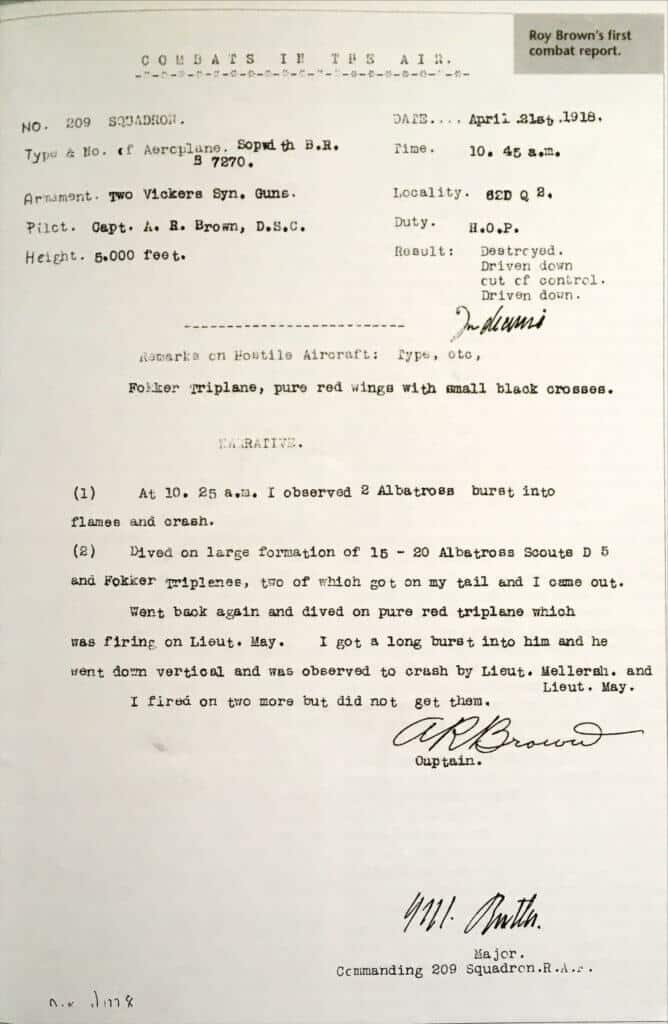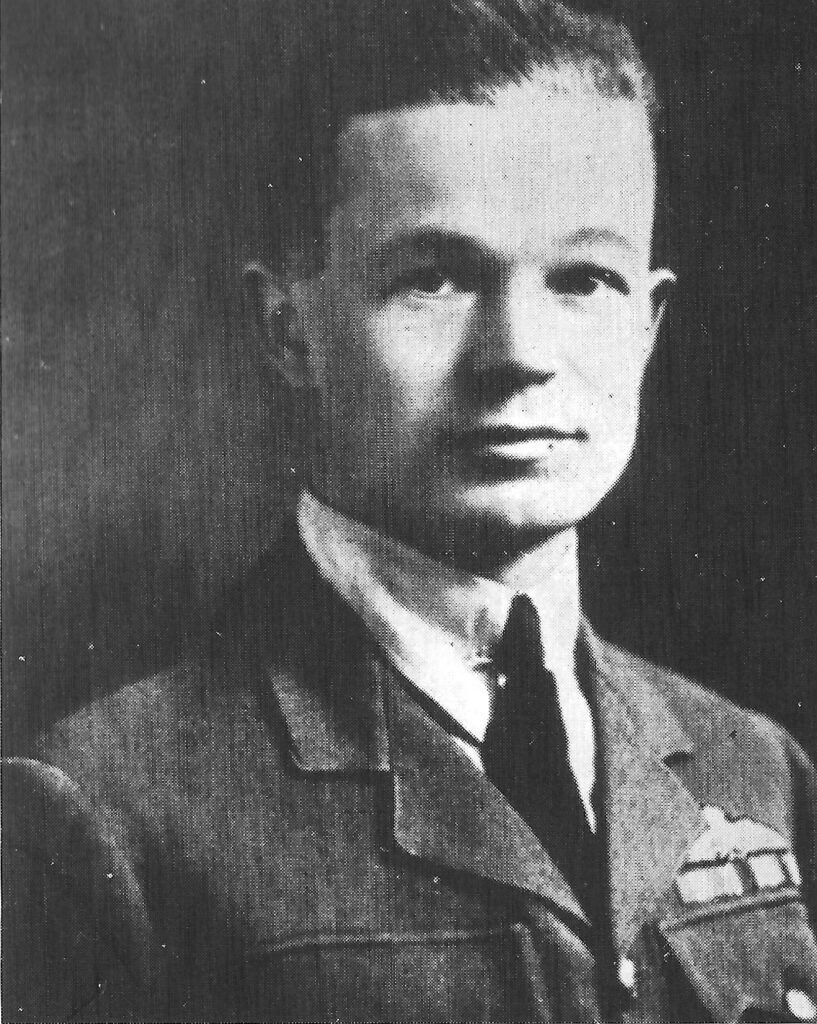Roy Brown tells
Event ID: 498
Categories:
22 April 1918
Source ID: 22
‘A. Roy Brown, the Canadian captain whose bullet killed Manfred von Richthofen, said the following about the dogfight he had with Manfred von Richthofen and in which the German was killed: ’I had a school friend who was now in the same squadron with me. He was Captain May, and we were really good friends. On Sunday morning, 21 April 1918, we were in the air together. On the way home we came across a number of enemy planes. We got into a fight, and I want to say from the outset that after a few seconds I had given up hope of ever getting out of this battle alive. But I always looked over at Captain May to my delight, and my heart beat with joy in spite of all my distress when I saw that May had succeeded in shooting down a German aeroplane. May turned round immediately after his victory to fly home. I had urged him to do so because he was a novice and because a fight must have taken such a toll on him that there was no point in staying in the air for long afterwards. But the moment he shot off, I saw a red aeroplane throwing itself at him. That made me feel sick. But when I went to help him, I had to fight for my own life, because three planes came at me to crush me and I was in the crossfire of their guns. There was no way out! Anyway, I wanted to make it as uncomfortable as possible for them! So, peace and quiet! I can’t remember being afraid. If it was to be the end, well, at least I’d be in the driver’s seat of my old machine! I began to manoeuvre. Sometimes I was going here, sometimes there, somersaulting, spiralling, zigzagging, just not offering a fixed target! I tried every trick I knew, some of them were new to me, I had never tried them before. The thought of involving her in a collision quietly came to me. I let them come straight at me, then I did an ‘Immelmann’, upwards, then back. I reappeared from underneath them. I could just see two of them miss each other by a hair’s breadth. The third one would almost have been caught if he hadn’t made a wide berth.
I had time to catch my breath. While they were getting up, I tried to spiral upwards. Now they turned and came at me again. I held my course until they almost collided with me, then I tipped to the side and was now lying flat underneath them. Again, they narrowly avoided a collision. I tried with all my might to gain height. They lost sight of me as I straightened up.
My first thought was: where is May? I anxiously searched the sky for him, hoping to see him alive. At last I spotted him, heading towards Corbie, to the north of me, heading for home.
Then I realised he was being followed. Out of the haze, a bright red aeroplane shot after him, in such an advantageous position that could easily be his undoing. I continued to soar, possibly to bring quick help to May. He tried to escape, swerving now here, now there, zigzagging, but the red one kept right behind him. They were like two giant hornets chasing each other, forwards, sideways, round again. They made all their movements together. Every turn May made was repeated by his opponent. May didn’t seem to be inferior to him yet.
But I soon saw the German gaining ground. He gave up all manoeuvres and flew in a straight line, visibly reducing his distance. May still had the advantage, if he managed to maintain his speed… Suddenly I realised that he was trapped. He had tried every trick he knew, he was at his wit’s end. The red plane was barely a hundred feet away and on the same level as May; he could open fire at any moment. Luckily I had reached three thousand feet by now. I swivelled sharply round, turned, straightened up and then, head first, I shot towards the tail end of the red.
I had all the trump cards in my hand. I was on top of him and coming from behind. May twisted and turned like a fish on a fishing rod. The ‘Red’ was about to launch his first salvo when the moment came for me!
May had given up. ‘The end,’ he thought and sat up to receive the death blow. That’s when he heard my machine gun. He looked over his shoulder. ‘Thank God, Brownie!’
When he looked round again, the ‘red one’ had disappeared, over the edge of his aeroplane he saw it hit the ground low down.
Richthofen’s end was exactly like that of most of his victims. He had been taken by surprise, he was dead before he could recover from his surprise.
Everything had happened so accidentally, so easily. I had come down until my front end was over the end of his tail, then I fired. The bullets tore off his elevator and shredded the back of the plane. Flames showed where the bullets hit.
My aim was too short! I pulled gently on the controls… I lifted a little, war training exercise, now you can do it. A full salvo tore open the side of the plane. The pilot turned round and looked up. I saw his eyes light up behind the big glasses, then he collapsed onto the seat, bullets whistling around him. I stopped firing.
Richthofen was dead. It all happened in seconds, faster than you can tell. His plane shuddered, swayed, rolled over and crashed into the ground.
The Australians’ reserve trenches were only three hundred feet below us. It was a short crash, May saw it, Mellersh saw it too, and I saw it as I swung round.
Mellersh had a graze shot on his hand. Two enemies were after him. I set about helping him as quickly as I could. The Germans spiralled out of the fight and flew away. The fight was over, everyone had had enough. Tired, I returned to Bertangles. The many manoeuvres had taken their toll on the plane, the propeller hardly wanted to cooperate. But I reached the aerodrome.
The first person to greet me was May, who ran up to me and grabbed my hand. “Thank God, Brown, did you catch the red one? It looked bad with me, one second later and it would have been over with me.” He was glad to be alive. The name Richthofen was not mentioned with a single syllable. I didn’t say anything either. I had the feeling that that red fighter pilot had been Richthofen, the German eagle of the skies, but the thought of having defeated him seemed like immodesty to me.
Soon afterwards I sat down to write my report. I mentioned that I had destroyed a bright red machine. My logbook showed the following entry under that date: “Encountered large swarm of enemy aircraft and Albatros single-seater. Three machines chased me, so I took off. Gained height. Returned, shot down a completely red machine that was chasing May, sent him down. Observed by Lieutenants Mellersh and May, then attacked two planes pursuing Lieutenant Mellersh. Unsuccessful!”
Rrrrrrrrr…rrrrr, the telephone. The commander on the line. Simpsons, our chief engineer, left to answer. Came back! “Jeez, Brownie! Get ready for the medals!” ‘What for?’ ‘The old man says the red plane was Richthofen.’ I almost fainted. I had already had a feeling that it had been him, so Richthofen after all! The ‘Red Baron’, Germany’s most famous aviator!
It was a day of glory for the division. We were finally able to start eating. We had just finished the last course when Cairns, the commander, entered. We saluted and he came up to me, looking serious. There was no sign of any desire to congratulate me. His voice sounded cool: ‘So Brown, you claim to have shot down Richthofen?’ ‘No, not at all!’ ‘I thought so?’ “No, I only claim to have shot down a red-painted Fokker. I don’t know the pilot.” “Well, it was Richthofen! But the thing is, the Australian machine gun section says they shot him down from below. There’s also a report that he was brought down by an R.E. 8, and then your report. It looks bad enough!”
Then I took the car the commander had left waiting. I picked him up and off we went to the quarters of the 11th Australian Infantry Brigade. We drove without saying a word. Cairns didn’t talk much anyway, and I didn’t feel like chatting. We found the commander’s tent hidden on a hill in the middle of a copse. I think it was somewhere west of Corbie.
We found Richthofen. He had been laid down near a military hospital that was in flames. A few people were standing around. The sight of Richthofen as I approached gave me a shock. He seemed so small, so dainty. He looked so friendly, his feet were as narrow as a woman’s. They were in fine Uhlan boots, shiny and polished. There was an elegance about them that didn’t fit at all when they looked out from under the rough flying suit. His cap had been removed and his blond, silky hair, like a child’s, fell from his broad, high forehead. His face, particularly peaceful, had an expression of gentleness and kindness, of nobility.
And suddenly I felt miserable, unhappy, as if I had committed an injustice. No feeling of joy could arise that Richthofen was lying there, the greatest of them all! A feeling of shame, a kind of anger against myself, gripped me at the thought that I had forced him to lie there now, so quiet, so peaceful, without life. This man who had been so full of life only a short time ago. And in my heart I cursed the compulsion that drove me to kill, I gritted my teeth, I cursed the war!
If I could have, how I would have loved to call him back to life, but that is different from shooting a gun, I could no longer look him in the face. I walked away, not feeling victorious. There was a choke in my throat. I waited for Cairns to finish his examination. If it had been my dearest friend, I couldn’t have felt greater pain. Surely I would not have felt so miserable had I not had the misfortune to know that I had killed him.”


Comments (0)